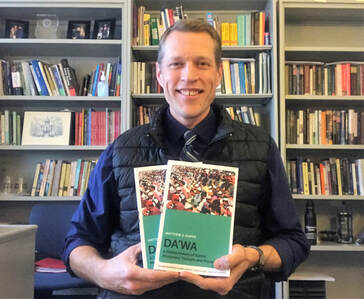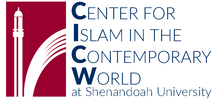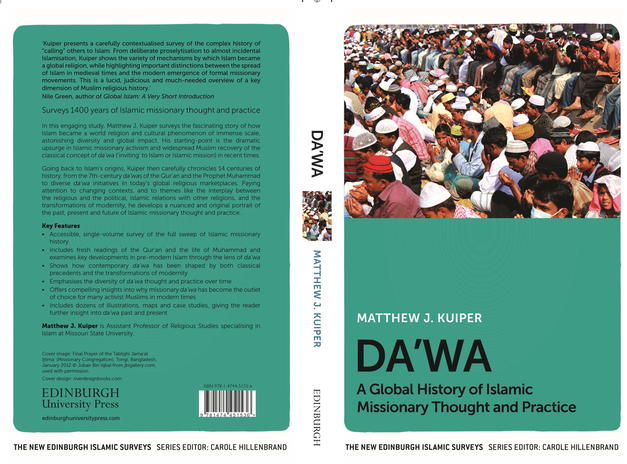Da'wa: A Global History of Islamic Thought and Practice
Dr. Matthew Kuiper (Missouri State University)
Dr. Matthew Kuiper (Missouri State University)

A research grant from Shenandoah University’s Center for Islam in the Contemporary World (CICW) helped Matthew Kuiper, an assistant professor of Religious Studies at Missouri State University, complete his recent book on Islamic da‘wa (“inviting” to Islam, or Islamic mission). The book, Da‘wa: A Global History of Islamic Missionary Thought and Practice, is set to be published in February 2021 by Edinburgh University Press. Part I, or Chapters 1-4, covers Islamic missionary thought and practice from the Qur’an to roughly 1700 CE. Part II, or Chapters 5-7, covers Islamic missionary thought and practice in early modern and modern times.
At the time Kuiper was awarded the CICW grant, he had already written Part I and was preparing to begin intensive work on Part II of the book. Part II is very significant in the work overall, since it covers the modern period, a period in which da‘wa discourses and activities have surged among Muslims worldwide. The realm of Islamic da‘wa today, although given scant attention in academic circles and the media, is a realm of tremendous significance, dynamism, and diversity. Even though the word “da‘wa” is instantly recognizable to millions of Muslims worldwide, there are few introductory works in English on the subject. Nor has Islam been studied specifically – and in a single volume – as a boundary-crossing “missionary religion.” Kuiper’s book attempts to fill this lacuna.
Among the book’s primary arguments is that that there is a discernible story of da‘wa in Islam, even if that story is marked by significant diversity and change over time. Though modernity has certainly resulted in new styles of da‘wa (such as outreach through television and the internet) these should still be understood within the older missionary history of Islam. On the one hand, Islamic missionary activity aimed at reviving Muslims and secondarily at outreach to non-Muslims – “da‘wa as missionary propagation” – provides a major lens of the book. On the other hand, since “da‘wa” has also been used as a language of oppositional politics throughout history, a focus on “da‘wa as religio-political summons” is also maintained. However, the book helps to overcome western fixation on political or militant Muslim groups by demonstrating that, over the last century or so, peaceful missionary da‘wa has proven more attractive and has had a more dramatic impact worldwide. In the end, the book aims to show that da‘wa provides a compelling lens into the study of modern Islam and Islamic history as a whole.
The CICW’s generous grant enabled Kuiper to take two research and writing retreats in 2019. During these retreats, he made significant progress toward completing the manuscript. On his first week-long retreat, he was able to do research and utilize library resources at the University of Notre Dame. Kuiper’s book research coincided nicely with the CICW’s 2019 theme of “Islam on the Edges.” Da‘wa movements – past and present – have often pushed their participants toward geographical and theological “edges.” Indeed, a noteworthy feature of Kuiper’s book in this respect is its argument that many pioneering developments in the realm of da‘wa have emerged from the so-called “periphery” of the Muslim world – from places like India, Indonesia, South Africa, Europe, North America, and elsewhere. While the book gives due attention to the Middle Eastern heartlands of Islam, by also staying attentive to the “edges,” it provides a truly global survey.
Kuiper is truly grateful for the support of the CICW and would recommend this grant program to anyone working in Islamic Studies!
At the time Kuiper was awarded the CICW grant, he had already written Part I and was preparing to begin intensive work on Part II of the book. Part II is very significant in the work overall, since it covers the modern period, a period in which da‘wa discourses and activities have surged among Muslims worldwide. The realm of Islamic da‘wa today, although given scant attention in academic circles and the media, is a realm of tremendous significance, dynamism, and diversity. Even though the word “da‘wa” is instantly recognizable to millions of Muslims worldwide, there are few introductory works in English on the subject. Nor has Islam been studied specifically – and in a single volume – as a boundary-crossing “missionary religion.” Kuiper’s book attempts to fill this lacuna.
Among the book’s primary arguments is that that there is a discernible story of da‘wa in Islam, even if that story is marked by significant diversity and change over time. Though modernity has certainly resulted in new styles of da‘wa (such as outreach through television and the internet) these should still be understood within the older missionary history of Islam. On the one hand, Islamic missionary activity aimed at reviving Muslims and secondarily at outreach to non-Muslims – “da‘wa as missionary propagation” – provides a major lens of the book. On the other hand, since “da‘wa” has also been used as a language of oppositional politics throughout history, a focus on “da‘wa as religio-political summons” is also maintained. However, the book helps to overcome western fixation on political or militant Muslim groups by demonstrating that, over the last century or so, peaceful missionary da‘wa has proven more attractive and has had a more dramatic impact worldwide. In the end, the book aims to show that da‘wa provides a compelling lens into the study of modern Islam and Islamic history as a whole.
The CICW’s generous grant enabled Kuiper to take two research and writing retreats in 2019. During these retreats, he made significant progress toward completing the manuscript. On his first week-long retreat, he was able to do research and utilize library resources at the University of Notre Dame. Kuiper’s book research coincided nicely with the CICW’s 2019 theme of “Islam on the Edges.” Da‘wa movements – past and present – have often pushed their participants toward geographical and theological “edges.” Indeed, a noteworthy feature of Kuiper’s book in this respect is its argument that many pioneering developments in the realm of da‘wa have emerged from the so-called “periphery” of the Muslim world – from places like India, Indonesia, South Africa, Europe, North America, and elsewhere. While the book gives due attention to the Middle Eastern heartlands of Islam, by also staying attentive to the “edges,” it provides a truly global survey.
Kuiper is truly grateful for the support of the CICW and would recommend this grant program to anyone working in Islamic Studies!
Photos courtesy of Dr. Matthew Kuiper
Dr. Matthew Kuiper is an assistant professor of religious studies at Missouri State University in Springfield, MO. He obtained his Ph.D. in Islamic Studies from the University of Notre Dame. At Missouri State University, Dr. Kuiper teaches courses on world religions and Islam.

